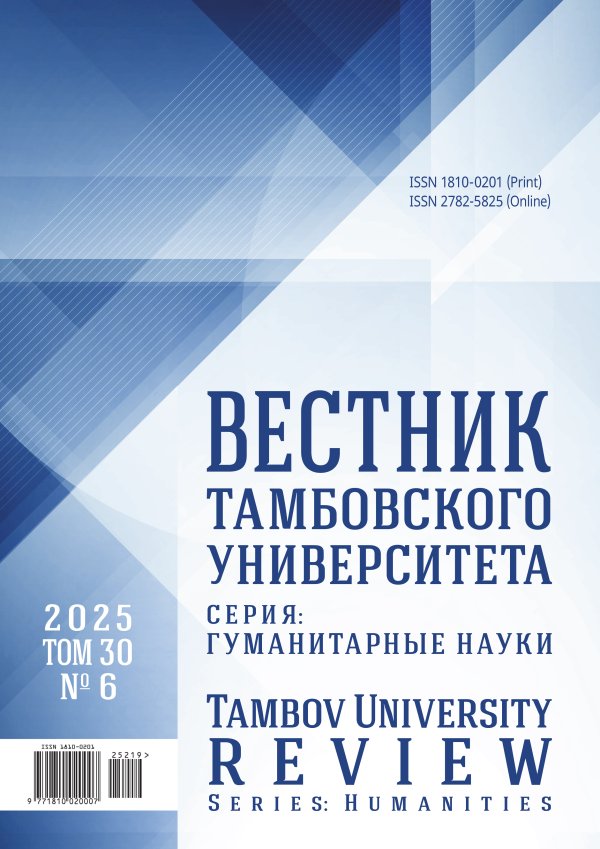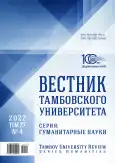Дивергентное мышление обучающихся: категориально-понятийный анализ
- Авторы: Макарова Л.Н.1, Кочукова О.Н.2
-
Учреждения:
- ФГБОУ ВО «Тамбовский государственный университет им. Г.Р. Державина»
- Управление Министерства внутренних дел России по Тамбовской области
- Выпуск: Том 27, № 4 (2022)
- Страницы: 847-861
- Раздел: ПЕДАГОГИКА ВЫСШЕЙ ШКОЛЫ
- URL: https://journal-vniispk.ru/1810-0201/article/view/298260
- DOI: https://doi.org/10.20310/1810-0201-2022-27-4-847-861
- ID: 298260
Цитировать
Полный текст
Аннотация
Рассмотрены педагогические аспекты становления междисциплинарной категории «дивергентное мышление». Цель исследования – конструирование дефиниции «дивергентное мышление студентов вуза» на основе сущностных и специфических характеристик названного феномена с учетом критериев необходимости и достаточности. Для достижения поставленной цели использовались: контент-анализ научной литературы, методы категориально-системной методологии: «Двухуровневая триадическая дешифровка категорий», «Формально-логический метод определения понятия». Выделены и описаны сущностные характеристики и природа дивергентного мышления, разработана двухуровневая триадическая модель данной категории. На основе названной модели сконструировано определение понятия «дивергентное мышление», которое, в сравнении с другими определениями, встречающимися в литературе, наиболее полно и целостно отражает его ключевые сущностные характеристики. В результате применения формально-логического метода разработана дефиниция «дивергентное мышление студентов вуза», позволяющая интерпретировать названное понятие и его проявления с точки зрения личностно-творческого развития студентов в условиях образовательного процесса вуза. Полученные теоретические результаты анализа становления категории «дивергентное мышление обучающихся» возможно использовать при разработке технологии формирования и развития данного вида мышления студентов в образовательном процессе вуза.
Об авторах
Л. Н. Макарова
ФГБОУ ВО «Тамбовский государственный университет им. Г.Р. Державина»
Email: mako20@inbox.ru
ORCID iD: 0000-0003-1167-4185
доктор педагогических наук, профессор, зав. кафедрой педагогики и образовательных технологий
392000, Российская Федерация, г. Тамбов, ул. Интернациональная, 33О. Н. Кочукова
Управление Министерства внутренних дел России по Тамбовской области
Автор, ответственный за переписку.
Email: olga-nek22@yandex.ru
ORCID iD: 0000-0002-7307-3265
начальник отделения организации психологической работы отдела морально-психологического обеспечения управления по работе с личным составом
392002, Российская Федерация, г. Тамбов, ул. Энгельса, 31Список литературы
- Майданник И.А. Развитие дивергентного мышления у старших дошкольников в процессе креативных игр: автореф. дис. … канд. психол. наук. Ставрополь, 1997. 22 с.
- Иванов А.Н. Система специальных заданий как дидактическое средство развития дивергентного мышления младших школьников: автореф. дис. … канд. пед. наук. Мурманск, 2007. 20 с.
- Ленкова А.А. Формирование дивергентного мышления младших школьников в процессе внеучебной деятельности: автореф. дис. … канд. пед. наук. Челябинск, 2011. 26 с.
- Тетина С.В. Предметная олимпиада школьников как средство развития дивергентного мышления старшеклассников: автореф. дис. … канд. пед. наук. Грозный, 2019. 28 с.
- Шеломенцева И.И. Формирование дивергентного мышления будущих менеджеров в процессе профессиональной подготовки в вузе: автореф. дис. … канд. пед. наук. Челябинск, 2010. 24 с.
- Игумнова А.С. Дивергентное мышление в контексте профессиональной деятельности учителя начальных классов // Личностное и профессиональное развитие будущего специалиста / отв. ред. Л.Н. Макарова. Тамбов: Изд. дом «Державинский», 2019. С. 56-62.
- Гилфорд Дж. Три стороны интеллекта // Психология мышления. М.: Прогресс, 1965. С. 433-456.
- Torrance E.P. Scientific views of creativity and factors affecting its growth // Daedalus: Creativity and Learning. 1965. Р. 663-679.
- Пиаже Ж. Роль действий в формировании мышления // Вопросы психологии. 1965. № 6. С. 33-52.
- Mednich S.A. The associative basis of the creative process // Psychol. Rewiew. 1969. № 2. Р. 220-232.
- Брушлинский А.В. Субъект: мышление, учение, воображение. Москва: Изд-во «Институт практической психологии»; Воронеж: НПО «Модэк», 1996. 392 с.
- Стернберг Р., Григоренко Е. Инвестиционная теория креативности // Психологический журнал. 1998. Т. 19. № 2. С. 144-160.
- Холодная М.А. Психология интеллекта. Парадоксы исследования. М.: Юрайт, 2022. 334 с.
- Мещеряков Б., Зинченко В. Большой психологический словарь. СПб.: Прайм Еврознак, 2006. 672 с.
- Ясюкова Л.А. Психологическая профилактика проблем в обучении и развитии школьников. СПб.: Речь, 2003. 384 с.
- Немов Р.С. Психологический словарь. М.: Гум. изд. центр ВЛАДОС, 2007. 560 с.
- Цыренова Т.Л. Развитие творческих способностей школьников как значимый результат образовательной деятельности // Вестник Бурятского государственного университета. Педагогика. Филология. Философия. 2012. № 15. С. 121-125.
- Богоявленская Д.Б., Сусоколова И.А. К вопросу о дивергентном мышлении // Психологическая наука и образование. 2006. № 1. С. 85-96.
- Блауберг И.В., Юдин Э.Г. Становление и сущность системного подхода. М.: Наука, 1973. 271 с.
- Дрязгунов К.В. Формирование дивергентного мышления старшеклассников на уроках обществознания // Образование и общество. 2003. № 1. С. 40-49.
- Amabile T.M. The social psychology of creativity. N. Y.: Springer-Verlag, 1983. 245 р.
- Barron F., Harrington D.M. Creativity, intelligence, and personality // Annual Review of Psychology. 1981. Vol. 32. P. 439-476.
- Eysenck H.J. Creativity and personality: A theoretical perspective // Psychological Inquiry. 1993. Vol. 4. P. 147-178.
- Gough H.G. A creativity scale for the Adjective Check List // Journal of Personality and Social Psychology.1979. Vol. 37. P 1398-1405.
- MacKinnon D.W. Personality and the realization of creative potential // American Psychologist. 1965. Vol. 20. P. 273-281.
- Айхель Н.В. Педагогические условия формирования познавательных умений младших школьников в проектной деятельности // Научный результат. Педагогика и психология образования. 2022. Т. 8. № 2. С. 37-46. https://doi.org/10.18413/2313-8971-2022-8-2-0-4
- Васильева А.В. Конструирование дефиниции категории «интерактивное обучение» методом двухуровневой триадической дешифровки категории // Известия Российского государственного педагогического университета им. А.И. Герцена. 2021. № 200. С. 101-113. https://doi.org/10.33910/1992-6464-2021-101-113
- Ванягина М.Р. Целеполагание и аксиология профессионально-ориентированного иноязычного обучения в высшей военной школе // Известия Юго-Западного государственного университета. Серия: Лингвистика и педагогика. 2021. Т. 11. № 1. 82-93.
- Клюшникова Е.А., Толстова Н.В., Артамонова М.Н. Конструирование дефиниции понятия «Street workout» // Современный ученый. 2022. № 1. С. 130-135.
- Железнякова Е.А. Русский язык как неродной для детей мигрантов: определение понятия // Мир науки, культуры, образования. 2021. № 5 (90). С. 36-38. https://doi.org/10.24412/1991-5497-2021-590-36-38
- Разумов В.И., Сизиков В.П. Информационные основы синтеза систем: в 3 ч. Омск, 2007. Ч. 1. Информационные основы системы знаний. 266 с.
- Разумов В.И., Сизиков В.П. Категориальный аппарат развития теоретического знания // Вестник Омского университета. 2003. Вып. 2. С. 37-40.
- Боуш Г.Д., Разумов В.И. Методология научного исследования (в кандидатских и докторских диссертациях). М.: ИНФРА-М, 2021. 227 с. https://doi.org/10.12737/991914
- Светлов В.А. Практическая логика. СПб.: ООО «Изд-во «Росток», 2003. 688 с.
- Гилфорд Дж. Структурная модель интеллекта // Психология мышления / под ред. А.М. Матюшкина. М.: Гардарики, 2005. С. 37-45.
- Дорфман Л.Я. Дивергентное мышление и дивергентная индивидуальность: ресурсы креативности // Личность, креативность, искусство. Пермь: Перм. гос. ин-т искусства и культуры, Прикамский соц. ин-т, 2002. С. 89-120.
- Шаршов И.А. Профессионально-творческое саморазвитие: методология, теория, практика. Москва; Тамбов: Центр-Пресс, 2005. 400 с.
- Христофоров С.В. Дефиниция опыта в педагогике: сущностные характеристики // Известия Российского государственного педагогического университета им. А.И. Герцена. 2006. Т. 7. № 17. С. 46-54.
- Ефимчук Е.Г., Цыгулева М.В. Творческая образовательная среда как условие развития профессионального опыта студентов технического вуза // Человек и образование. 2019. № 1 (58). С. 151-155.
Дополнительные файлы









